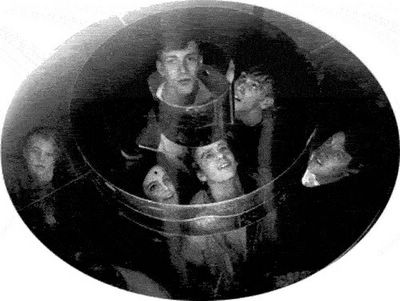What's Beyond Postmodernism?

One hot topic in Postmodern circles is how to rid ourselves of the term "Postmodern". No one wants to be identified primarily by what they are not, or what they object to (unless of course, you are a Protestant, but I digress).
It has been important to keep the term up until now to make it clear that the rationalistic assumptions of Modernity have been rejected. Despite impressive technological and medical advances, the utopian goals of the Enlightenment failed. The grand experiment where humanity shook off the fetters of religion and took up the reigns of existence only resulted in advanced bloodshed, world wars, the A bomb and now terrorism. What started with such loud promise at storming of the Bastille, finally died with a whimper two centuries later with the fall of the Berlin Wall.
So it is understandable that many of us want to identify ourselves as Postmodern. But the term itself is limiting and we need a new term, something beyond Postmodernism. A new term might help us understand the new freedom and possibilities that are in front of us.
And I have a suggestion.
The Suggestion
Note that it is a suggestion, and a hopeful one. The trick is to make it truly open ended enough to be inclusive, yet also formative enough to make sense. Then, of course, it has to resonate and be fair to all parties.
The idea first came to me in the late 80s. I was reading Gregory Bateson's book Toward an Ecology of Mind and trying to see if I could get his ideas to "talk" with my understanding of Ernest Becker's world view as presented in The Denial of Death, (which is one of the most important books written in the 20th Century). In order to see how these two great minds might meet I had to do a great deal of translation, in much the same way that you might place the Buddha's teaching on non-attachment next to Jesus of Nazareth's teaching about the "lilies of the field." You expect some divergence but are looking for some legitimate connections and different angles on the same truthes.
In the background of my mind was Becker's stated desire to form a uniform science of humanity, something that would allow for a multiplicity of voices on any given subject, and integrate exploration via all disciplines instead of pitting them against each other. Becker's vision for this was cut short by his untimely death, but has always seemed one of the most noble projects I had ever heard of.
I mean, imagine for a moment if instead of going into a humanities class and having them castrate or exclude some of the great world traditions, they actually included them and looked for correlations?
________________
Part two: an example


0 Comments:
Post a Comment
Subscribe to Post Comments [Atom]
<< Home